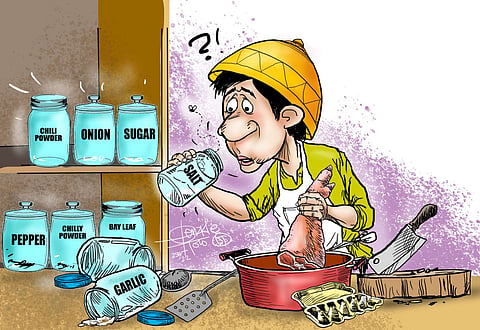
- NEWS
- the EDIT
- COMMENTARY
- BUSINESS
- LIFE
- SHOW
- ACTION
- GLOBAL GOALS
- SNAPS
- DYARYO TIRADA
- MORE

What goes into the Philippines' beloved stew, kare-kare?
You boil the oxtail or meat of choice with chopped onion. The vegetables are often cooked separately by sauteeing in garlic.
The dish of many versions across the archipelago recently made it to Tatler Atlas' "100 best stews in the world," and Filipinos will heartily accept this ranking, even if it is the 53rd. The website's users voted on this category.
What some people could be worried about, however, is how dishes like the kare-kare could cost an arm and a leg pretty soon if the food supply situation is not resolved.
Garlic and onion shortages, even salt, are imminent, the Department of Agriculture has warned recently. Local production will not be enough to meet the expected demand, the DA said in reports that also detailed the grim scenario painted by its attached agencies, covering "surf" and "turf."
Government must find solutions to the current challenge of food sufficiency.
Importation is one, covering the gaps in supply, especially garlic and salt, which are essential to Filipino cooking. Cheap imports, however, compete with local producers, who are mostly hard-put as well to improve their systems with better technology.
The salt industry is gunning for a bigger infusion of funds via the national budget.
Among other food items that are threatening the operations of those in the restaurant business are white onions, chicken and eggs, potatoes, and camote. People won't run out of fish and pork, the Bureau of Plant Industry says, but this is because of imports, which brings us back to the issues faced by local farmers and the agriculture sector in general.
Farmers remain among the country's poorest, and the youth are not eager to pursue a career in agriculture as it is considered non-lucrative.
In the realm of careers, it was not just the pandemic's effect on jobs and livelihood, but also on the country's supply chain due to transport halts, restrictions and lockdowns.
The Japan International Cooperation Agency cites a report by the Food and Agriculture Organization, saying "the pandemic and its related restriction measures have aggravated the lingering challenges faced by the Philippine agriculture sector such as low farmers' income and disconnected value chain."
JICA is in technical cooperation with the DA for a project "that seeks to study the gaps in the country's vegetable supply chain network, address food security, and help raise the income of farmers."
The JICA report further points out that while "some 7.9 million hectares of Philippine lands are devoted to agriculture,…(u) nfortunately, based on the Global Hunger Index, the country is ranked 68th out of 116 countries surveyed in terms of hunger level which could further be exacerbated by climate change patterns and evolving pandemic."
So with the bawang (garlic) in short supply, as well as salt producers, having "not produced enough," perhaps garlic rice will have to wait and the plain steamed variety should suffice for now. Anyway, it's best with kare-kare.
